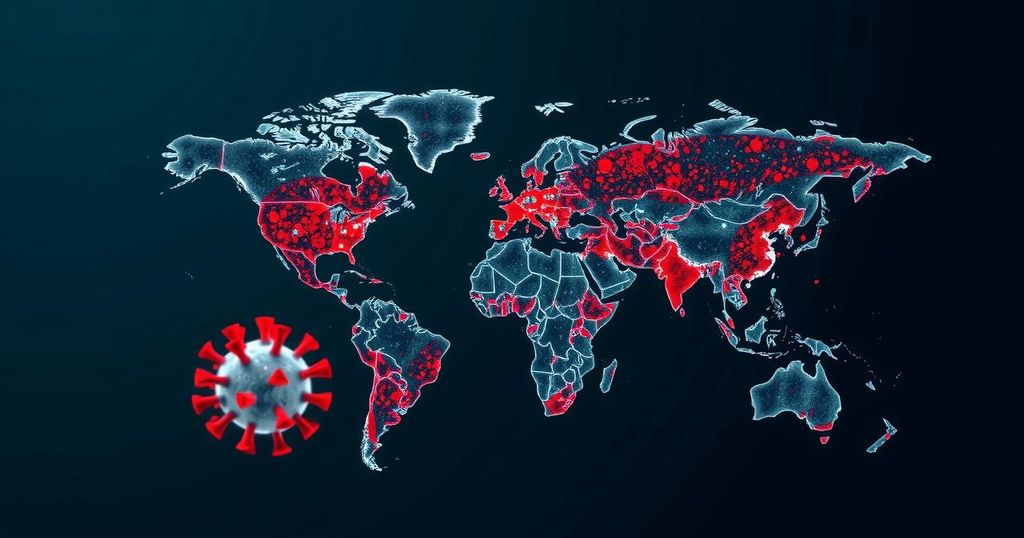The world faces significant health challenges, with 4.5 billion people lacking adequate health care access. Current threats include rising mpox cases and cholera outbreaks, with climate change exacerbating conditions for disease proliferation. An interview with Dr. Ahmed Ogwell highlights the moderate risk level of global health amid an urgent need for preparedness and cooperation to combat infectious diseases. The abandonment of COVID-19 lessons and geopolitical tensions further complicate health responses, necessitating urgent reforms and policies.
The global health landscape is currently facing severe challenges as approximately 4.5 billion individuals lack adequate access to essential healthcare services, as reported by the World Health Organization (WHO). This alarming situation comes in the wake of multiple public health threats, including a recent surge of mpox cases, which have now exceeded 100,000 globally, resulting in at least 200 recorded fatalities. Additionally, an ongoing cholera outbreak in Sudan has impacted nearly 15,000 individuals with a reported death toll of 473. The emergence of new COVID-19 variants further exacerbates the stresses on healthcare systems worldwide, particularly as antimicrobial resistance (AMR) emerges as a critical global health threat with the potential to claim up to 10 million lives by 2050. In an interview with Dr. Ahmed Ogwell, Vice President of Global Health Strategy at the United Nations Foundation, the state of international health preparedness was scrutinized. Dr. Ogwell articulated that the current health threat level is at a moderate risk. He emphasized the necessity of heightened surveillance and collaboration to mitigate the spread of infectious diseases such as mpox, cholera, and dengue fever while acknowledging the persisting effects of COVID-19 on global health infrastructures. A significant concern raised by Dr. Ogwell is the apparent neglect of crucial lessons learned during the COVID-19 pandemic. For instance, the public health practices established during the pandemic, such as wearing masks and rigorous sanitation, have largely been abandoned. Moreover, he criticized the diminishing urgency from policymakers in responding to new health outbreaks following the waning of COVID-19 protocols. The transmission dynamics of mpox, characterized by its reliance on close contact, stipulate a high risk for further spread, highlighting the interconnectivity of global health threats. Dr. Ogwell stresses that an outbreak in one region presents risks to the global community, necessitating solidarity in response strategies. However, geopolitical tensions and humanitarian crises introduce additional complexities, making coordinated health responses increasingly difficult. Furthermore, climate change is identified as a contributing factor to health vulnerabilities, providing fertile ground for the proliferation of diseases. Seasonal flooding and the exposure of previously secluded areas to human interaction have led to the emergence of pathogens that threaten public health.
The implications of inadequate healthcare access are profound, particularly in the context of a world still grappling with the repercussions of the COVID-19 pandemic. As various health threats surface, including mpox and cholera, the global community faces a critical juncture necessitating an assessment of its readiness to combat future pandemics. The ongoing cholera outbreak in Sudan and the rising instances of new COVID-19 variants serve as reminders of the persistent vulnerabilities within global health systems. Additionally, antimicrobial resistance is emerging as a leading cause of mortality, emphasizing the urgent need for robust health infrastructure and preventive measures. Dr. Ahmed Ogwell’s insights highlight the pressing need for a collective response to these escalating health challenges, particularly in light of climate change and geopolitical instability.
In conclusion, the world stands at a precarious crossroads in terms of pandemic preparedness and health security. With vast segments of the population lacking essential healthcare access and the rise of infectious diseases and antimicrobial resistance, a collaborative approach is paramount. Dr. Ogwell’s analysis underscores the necessity of learning from past public health crises, prioritizing the strengthening of global health systems, and fostering solidarity in tackling the complex challenges posed by future outbreaks. Climate change further complicates this landscape, necessitating an integrated approach to health and environmental policies. The lessons from the COVID-19 pandemic must be diligently applied to enhance the resilience of healthcare systems worldwide, ensuring they are adequately equipped to confront emerging health threats effectively.
Original Source: www.aljazeera.com







